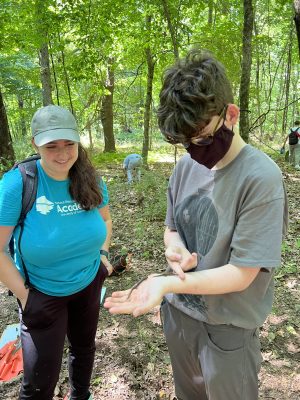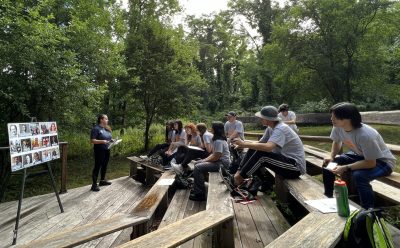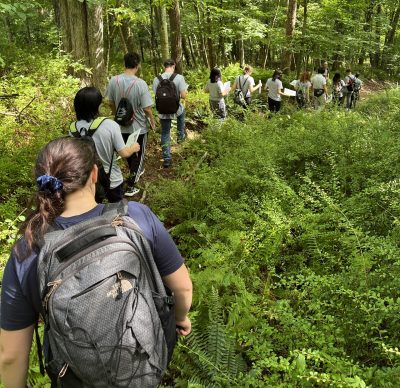This post was written by Abby Bar, Summer 2022 Environmental Education Intern.
 My internship at the Natural Resources Conservation Academy through UConn Extension has been incredibly beneficial in teaching me tools both in environmental education and in working in general. Through this experience, I gained new skill sets and techniques that I believe will be useful in my own education and career endeavors. For example, I learned how to set up and use camera traps to collect noninvasive data on wildlife. I also learned small mammal trapping techniques, water quality testing strategies, and certain mapping and GIS skills.
My internship at the Natural Resources Conservation Academy through UConn Extension has been incredibly beneficial in teaching me tools both in environmental education and in working in general. Through this experience, I gained new skill sets and techniques that I believe will be useful in my own education and career endeavors. For example, I learned how to set up and use camera traps to collect noninvasive data on wildlife. I also learned small mammal trapping techniques, water quality testing strategies, and certain mapping and GIS skills.
At the end of the summer I felt qualified to educate high school students in the UConn Pre-College Summer Environmental Conservation course co-taught by Laura and Nicole. It is a firm belief of mine that teaching others is the best way to guarantee I am truly understanding new information, so by assisting Laura and Nicole with running this course, I got to better comprehend the concepts and tools I was teaching.
A big struggle of mine as a  rising senior at UConn is figuring out my career and education path. Coming into this internship I hoped to get a better understanding of my goals. I believe that this program allowed me to better understand myself and the interests I’d like to pursue. My desire to work in an environmental field has solidified as a result of this internship. I also realized I thoroughly enjoy environmental education as a whole, and working with high school students to inspire them to pursue their passions is also very important to me.
rising senior at UConn is figuring out my career and education path. Coming into this internship I hoped to get a better understanding of my goals. I believe that this program allowed me to better understand myself and the interests I’d like to pursue. My desire to work in an environmental field has solidified as a result of this internship. I also realized I thoroughly enjoy environmental education as a whole, and working with high school students to inspire them to pursue their passions is also very important to me.
Understanding how to communicate information to this age group involved finding a balance of making sure the content wasn’t too simple or difficult to grasp, as well as interesting and engaging.
Overall, this experience allowed me to grow in many ways.  Particularly, I think that my communication skills really flourished over the summer. Not only did I have to communicate with mentors and other NRCA interns to create and plan educational activities, I also had to be a better communicator with students. Being able to talk to students about their interests and goals taught me a lot about how to best ensure that they are engaged and reaching their full potential in the course and beyond.
Particularly, I think that my communication skills really flourished over the summer. Not only did I have to communicate with mentors and other NRCA interns to create and plan educational activities, I also had to be a better communicator with students. Being able to talk to students about their interests and goals taught me a lot about how to best ensure that they are engaged and reaching their full potential in the course and beyond.
In summary, I believe that the tools and skills I used during this experience will give me a better foundation on which to begin an environmental career or continue my environmental education.